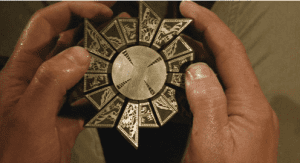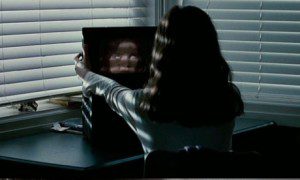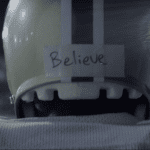There’s a box in front of you—about the size of a shoebox, black and plain, the lid hinged with brass fixtures and fastened with a huge, ornate lock.
The key that fits that lock is within reach—on the table, just beside your right hand. It, like the lock, is big and heavy, the shaft carved with deep runes and strange symbols. A tag—a plain, paper tag—is attached to the key with a simple string. “DO NOT USE!” it says in all caps.
Inside the box, you hear—or you think you hear—a faint scratching.
Do you open it?

That is the essence of horror. Imbued in these two objects—the mysterious box and the heavy key—lies the charm of the Halloween season, the appeal of supernatural horror movies, of ghosts and goblins and things that go bump in the night. And the temptation intrinsic in this scenario is intrinsically spiritual. There is something in the box. You have the power to open it, even though you’ve been told not to. Do you? Do you dare?
The Bible’s first horror story—told in the second and third chapter of Genesis—is predicated on that box and key. Only the box, in this case, is the fruit of the tree of life. Eve was told not to unlock the fruit’s secrets, but she did. And while the story doesn’t end with blood pouring out Eve’s eyeballs, the aftermath was indeed horrifying. To be kicked out of Eden is a terrible thing indeed.
The Bible returns again and again to the locked box, this sense of forbidden knowledge. There are things that we are not supposed to know; things we should not play with. The Tower of Babel was an effort to unlock that box, in a way—to reach God in some direct, forbidden. The Witch of Endor was the key to another locked box. Israel’s legion of wicked kings practiced divination, sometimes killing their own children to do so. None of these stories, you’ll recall, ended particularly well. And the concept of the locked box is carried all the way through Revelation, where we learn that only the Lamb of God is worthy to crack open the Seven Seals.

If you’re Christian—and really, I think this goes for many other faiths, too—you believe that God knows more than you, and that’s probably for the best. We’re short-sighted mortals. We’re imperfect creatures. We don’t have the capacity to “know” everything there is to know.
But we mortals are curious things. We don’t necessarily need a talking snake to tell us to take a bite of forbidden fruit. When we’re given a locked box and a key, it’s so tempting to use that key. We just want to peek. Just an eensy-weensy peek.
No wonder movies that offer us that peek—even if it’s a pretend peek—can be so strangely appealing.
Sometimes the box is quite literal. 2012’s The Possession, a little girl buys a creepy little box at a garage sale that holds a dybbuk—a malicious spirit from Jewish lore. Hellraiser, from 1987, features a strange little puzzle cube as both box and key. And lest we forget that most vampires from Nosferatu on spend their days in boxes—boxes that, by extension, hide terrifying secrets of life and hunger and immortality.
But many the best horror stories—at least the stories that I find scary—honor the concept of unlocking a terrible secret. The key used can look very different from film to film—from magic incantations (Candyman), videotapes (The Ring) and scientific hubris (Frankenstein) to forbidden books (Evil Dead), Ouija boards (The Exorcist) and the atomic bomb (Godzilla)—but the forces they unleash are dark and dreadful and, often, wholly evil.
Why do we find horror so fascinating? Psychologists often point to the fact that it gives us a vicarious thrill: When a chainsaw-wielding creep chases a teen through a forest, it puts us in the shoes of that teen, and we feel a bit of the poor guy’s energy, awareness and adrenaline, co-mingled with the relief that we’re actually safe at home, where the greatest peril we face is a slice of cheesecake. Others will suggest that horror movies can be a form of catharsis—a way of releasing pent-up emotions or even deal with real-world problems.

All that might be true, especially in the case of non-supernatural horror flicks. No one unlocked, say, Jaws. But when I think of the sorts of stories that draw me, they often come down to that metaphorical locked box and key; the forbidden knowledge just out of reach. I dare not open the box. But in the movies, someone else does for me. Someone else takes that terrible, sometimes blasphemous risk … and allows me a peek at what they find. It, too, is a vicarious thrill: It feels illicit, even a little dangerous.
No wonder many Christians look at horror movies as things to be shunned. Sure, maybe the box—the “forbidden knowledge”—isn’t real. It’s a fabrication brought to “life” thanks not to dark forces, but the writer, director and possibly a few quarts of fake blood. But these movies still depend on that sense of unlocking the forbidden. And the better the movie, more keenly we feel that sense of delving into things we ought not to.
But for me, I think, horror movies also remind me that of all life’s dangers, human vanity and hubris—the desire to claim for our own what is God’s own province—is perhaps the greatest of all. That in real life, there are some boxes that should stay locked.













